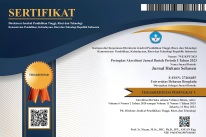Measuring Happiness In Utilitarianism Teachings
Abstract
This research aims to examine how to measure happiness in the teachings of utilitarianism, an ethical theory that focuses on maximizing the greatest happiness for the greatest number of people. The approach used in this research involves qualitative analysis. The qualitative approach includes literature studies to understand the theory of utilitarianism put forward by Jeremy Bentham and John Stuart Mill, as well as examining various methods of measuring happiness and criticism of utilitarianism. This study finds that although utilitarianism offers a logical framework for moral decision making, there are significant challenges in objectively measuring happiness and its fair application. Happiness is subjective and varies between individuals, with the potential for injustice to occur when the happiness of the majority is prioritized over the minority. A more objective and fair method of measuring happiness is needed, as well as the importance of considering individual rights in applying the principles of utilitarianism by considering overall welfare and distributive justice.
Downloads
Copyright (c) 2024 Ulma Roisa Azmi, Eka Rahmawati, Marsudi Dedi Putra

This work is licensed under a Creative Commons Attribution-ShareAlike 4.0 International License.






